Impoverished residents of Guizou's Yaoshan township relocate as it transforms itself
p.china.org.cn by Zhao Binyu,October 23, 2020 Adjust font size:
The mountainous region that runs through Yaoshan Yao township, Libo county, Qiannan Buyei and Miao autonomous prefecture has historically been one of the most impoverished parts of Guizhou province. The ethnic groups that have inhabited the area had to move deeper into the mountains in the past in order to avoid conflict and warfare. They have finally had the opportunity to leave the mountains, relocate to more prosperous locations, and live better lives in recent decades.

Gulei village, Yaoshan Yao township, Libo county, Guizhou province, its main thoroughfare, and the surrounding mountains in the area (Xinhua/Yang Wenbin)
“My new residence is 1,000 times better than my old one,” poverty alleviation relocation project participant He Guoqiang noted recently. “My former life is unimaginable.” The 39-year-old moved to the Xingwang community in the county seat of Libo in 2018. A photo of a small, broken wooden residence covered with black rubber roofing membrane and another of the modern buildings equipped with elevators that comprise the brand new community that he currently resides in hang on the walls of his home.
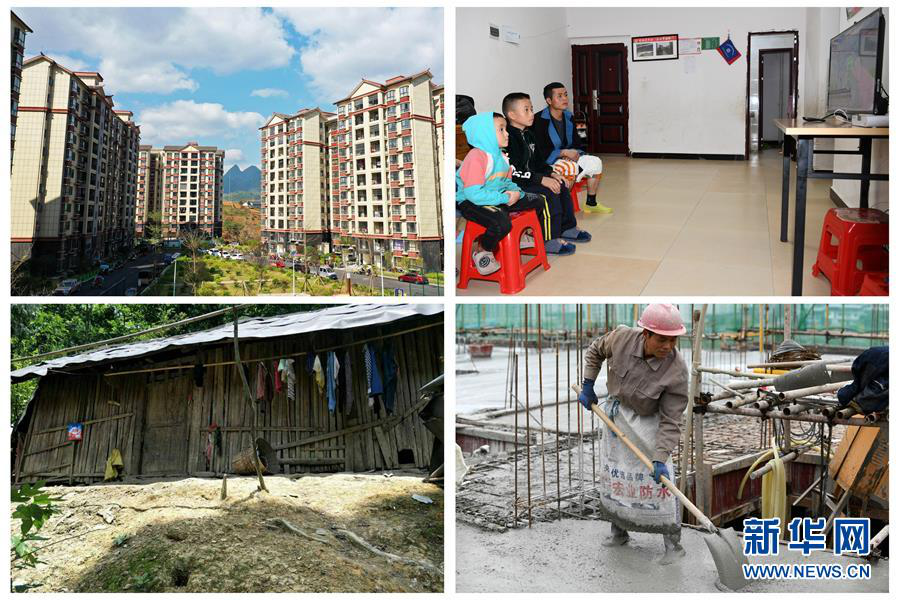
He Guoqiang’s current residence at the Xingwang community in the county seat of Libo. The photo was shot on Nov. 7, 2019 (top left)
He Guoqiang’s former home in Lapian village, Yaoshan Yao township, Libo county (bottom left)
He Guoqiang and his children watch TV in their new home on Nov. 6, 2019 (top right).
He Guoqiang works at a construction site in the county seat of Libo on Nov. 6, 2019 (bottom right). (Xinhua/Yang Wenbin)
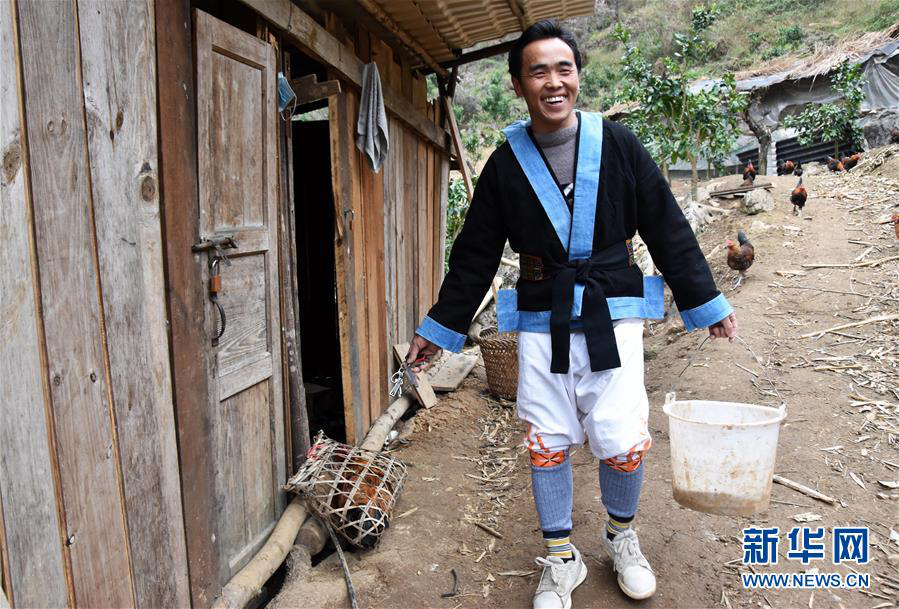
Luo Jiaojin works at his chicken farm amidst a honey pomelo orchard that he leases on the outskirts of the Xingwang community. He was also relocated to the community from Yaoshan Yao township a couple years ago. (Xinhua/Duan Xianju)
He Guoqiang's family participated in what was the seventh relocation program targeted at impoverished Yaoshan residents since 1949 and the sixth since China began to implement reforms and open up in 1978. The seven relocation programs that have been executed in the area over the years have mirrored the outstanding poverty reduction achievements that China has made in its extremely impoverished areas in general. Yaoshan emerged from poverty on schedule in March 2020 in line with the country’s overall poverty eradication goals.
Seven relocation programs help people leave impoverished mountainous areas
Also known as “guoshanyao,” Yaoshan’s ethnic Yao residents are a branch of the Baiku Yao ethnic group that had been living in the alpine area in southern part of Libo county in a primitive manner for a long period of time. Its members have historically engaged in hunting and slash-and-burn agriculture and tended to relocate every two to three years.
In 1955, a group of Yaoshan’s residents left a location deep in the mountains and resettled in Lapian village at the foot of the elevated area.
“I didn't even know what a regular bed was like,” He Guoqiang recalled. “My family used to sleep on grass and boards.” The Yaoshan native was born in 1981 and had to drop out of primary school as a result of the poverty that his family experienced. He lived in low, thatched cottage for more than ten years and later moved into a small, dilapidated wooden house.
Xie Jiabao, the first head of Yaoshan township, recalled that the governments at higher levels prioritized poverty alleviation efforts in the area after China began to implement reforms and open up. Grain and electricity were provided to the public free of charge for five years, and Yaoshan Ethnic Primary School students became “exempt from education fees and tuition fees.”
Land scarcity, transportation difficulties, and other issues stalled progress in the area, however. A second relocation program was implemented in 1996, and 30 households resettled to Shuifu Yao village.
In 1998, a national, seven-year-long poverty reduction campaign that was designed to help 80 million people escape from poverty led to a third resettlement program being executed in Yaoshan, and 70 households began living on the more abundant land present in Shuiyao new village.
Guizhou later implemented development-oriented poverty relief programs and two eco-migration projects in Yaoshan, which made it possible for a fourth group of 30 households, a fifth group of 150 households, and a sixth group of 315 households to move to two-story homes in Lapian village.
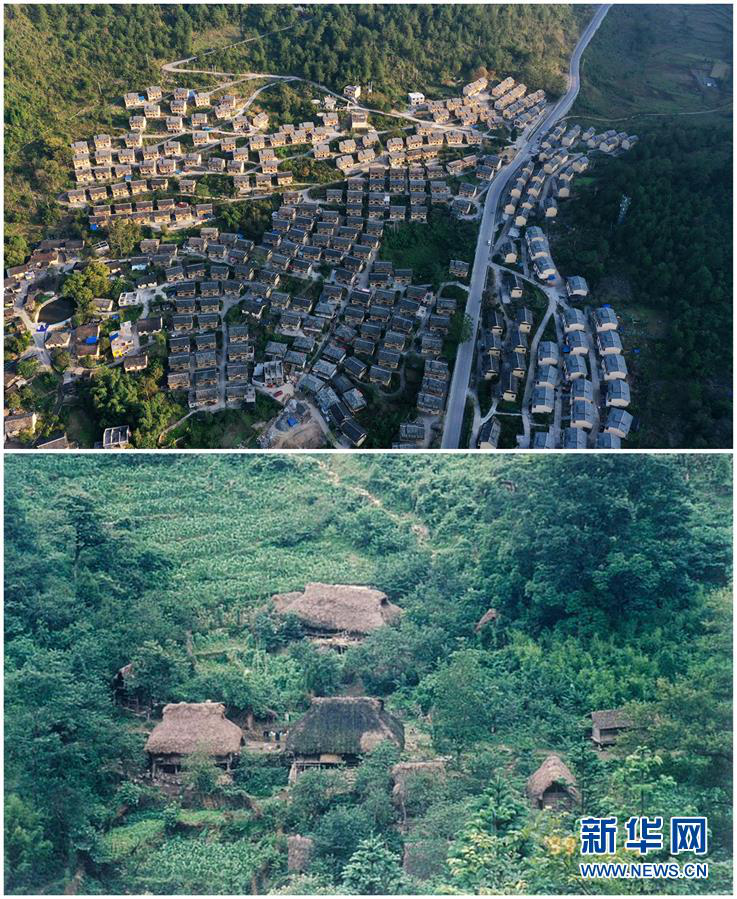
Yaoshan’s new Lapian eco-migration village on Nov. 5, 2019 (top, Xinhua/Yang Wenbin)
Thatched dwellings from the last century in Yaoshan township (bottom, courtesy of the People's Government of Yaoshan Yao township)
Yaoshan implemented the largest relocation program in its history from 2017 to 2019 amidst China’s current targeted poverty alleviation campaign. The township’s remaining impoverished residents were given the opportunity to live in a completely new environment and escape from poverty. The government invested over 60 million yuan (US$8.6 million) into the undertaking, 206 households who resided deep in the mountains moved to the county seat’s Xingwang community, and 40 families moved to Mengliu town, next to the entrance of the Xiaoqikong scenic area.
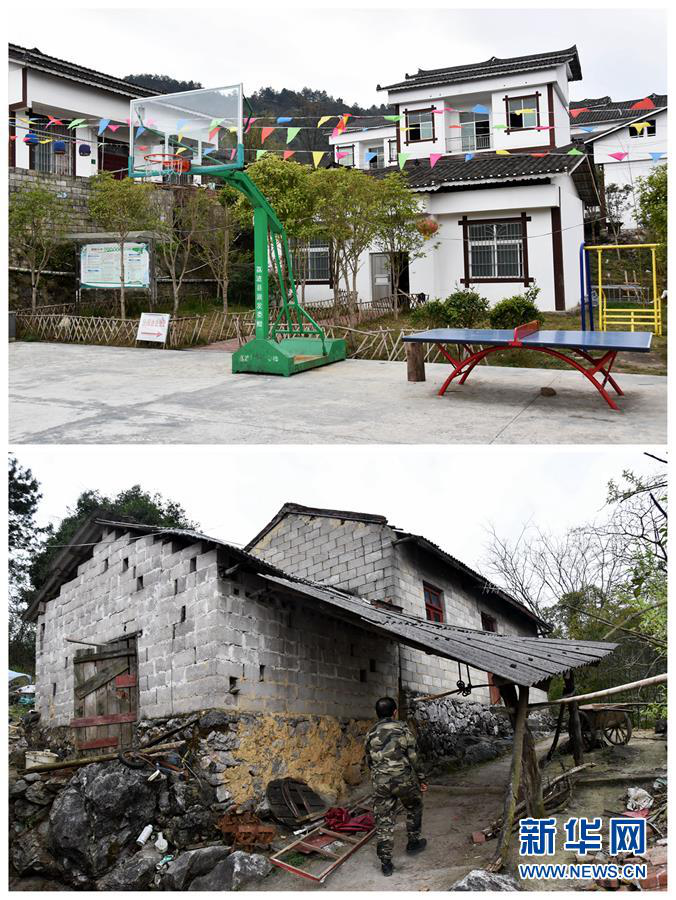
Shuiyao new village, Shuiyao township, Libo county (top)
The residence that an impoverished family lived in before they moved to Shuiyao new village in 1998 (bottom) (Xinhua/Duan Xianju)
The seventh relocation program targeted at impoverished Yaoshan natives was much different from the previous six. The project was more comprehensive, and a site in the county seat was chosen to serve as the main resettlement destination rather than a location in a rural area. Members of 246 households from Yaoshan and other townships moved to a new community that features the most complete infrastructure in the county.
Persistent efforts make it possible for Yao citizens to leave the mountains
“I've suffered a lot from my lack of education,” He Guoqiang stated while his children were quietly engaged in online classes in their home. “My dream is that my kids can be properly educated.” Many of the awards that they have received hang on the walls inside the family’s home. Wine vessels, shotguns, and birdcages are said to be the “three treasures” loved by Yao men, but He Guoqiang has not touched them in the past two years. He has become more energetic since he began living in the downtown area and much more devoted to his family.
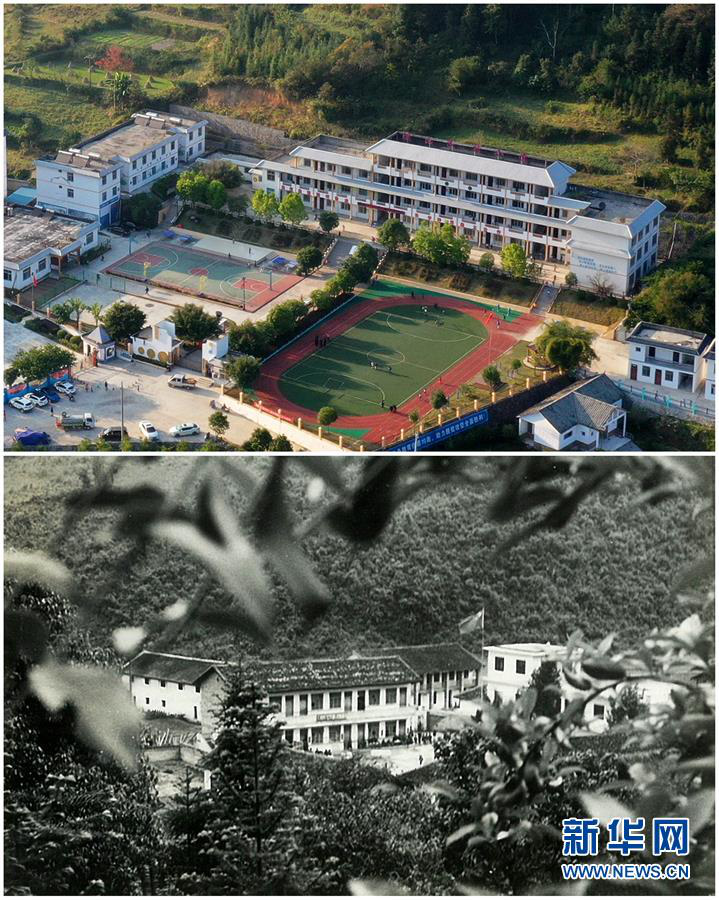
Libo county’s current Yaoshan Ethnic Primary School on Nov. 5, 2019 (top, Xinhua/Yang Wenbin)
The former Yaoshan Ethnic Primary School (bottom, courtesy of the People's Government of Yaoshan Yao township)
“People shut their doors and refused to move at first,” ethnic Buyi citizen and township official He Chunliu recalled. She was involved with the implementation of Yaoshan’s seventh resettlement program and noted that her team repeatedly visited local villagers, patiently explained the project to them, and hoped that they would want to participate because many were afraid of the outside world.
People who lived in other townships have relocated to the Xingwang community as well. The governments of the areas that they are from each assigned an official to provide follow-up services for them, but Yaoshan decided to send three. They helped illiterate residents identify building numbers, took them on tours of the county seat, and helped them become familiar with the locations of produce markets, supermarkets, hospitals, schools and public squares.
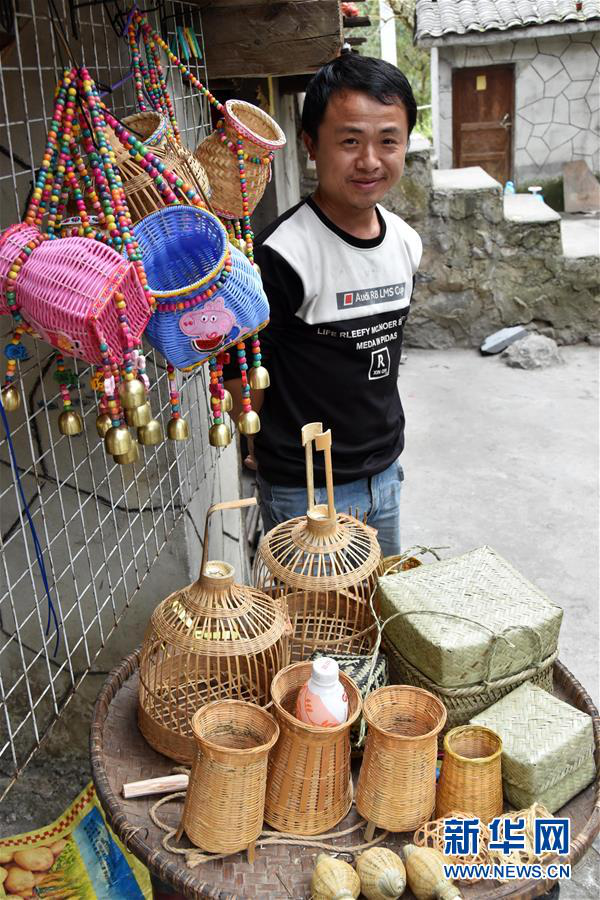
A resident of Yaoshan’s Dongmeng Yao village sells woven Yao baskets and other products that he makes. The traditional hamlet was designated a protected historical village after its inhabitants moved away in order to promote tourism and employment in the area. (Xinhua/Duan Xianju)
“[He Guoqiang’s wife] Li Meili held the edge of my dress tightly and followed me the first time I took her to look for a job,” He Chunliu recounted when recounting efforts that she made to help the couple after they moved into their new home. Li eventually became more confident, generous, and sociable after becoming employed as a caretaker at a nursing home, and He Guoqiang received help obtaining a job at a construction site.
“There are 357 people in the group,” He Chunliu explained when discussing a WeChat group that she runs for the purpose of helping relocated citizens become employed. “We have implemented targeted measures in order to help everyone who has been impacted by the COVID-19 pandemic become employed and have been posting job information since the end of February.” Citizens who have worked with the young woman have indicated that she is very helpful and always provides timely assistance to anyone who is in need.
Generation after generation of officials have devoted their lives to the seven relocation programs that have assisted impoverished Yaoshan natives over the years. Some tension emerged between people who resettled in Shuiyao new village and the Buyi villagers who live in the surrounding area at first, so Qin Hongjian – himself an ethnic Buyi citizen – was assigned by the county authorities to serve as Shuiyao’s Party chief. He took some of the grain that his family grew to the village with him because it was experiencing a food shortage at the time. Qin devoted himself to assisting the village and its residents for 19 years until he died in August 2018 as a result of gastric cancer.
Annual income rose to 6,545 yuan (US$938) per capita at the end of 2018 in Shuiyao, which marked the end of absolute poverty for its residents. In order to commemorate Qin, those resettled villagers conducted a ceremony involving bronze drums being beaten for an extended period of time until they reverberated seemingly endlessly – the highest public Yao ritual.
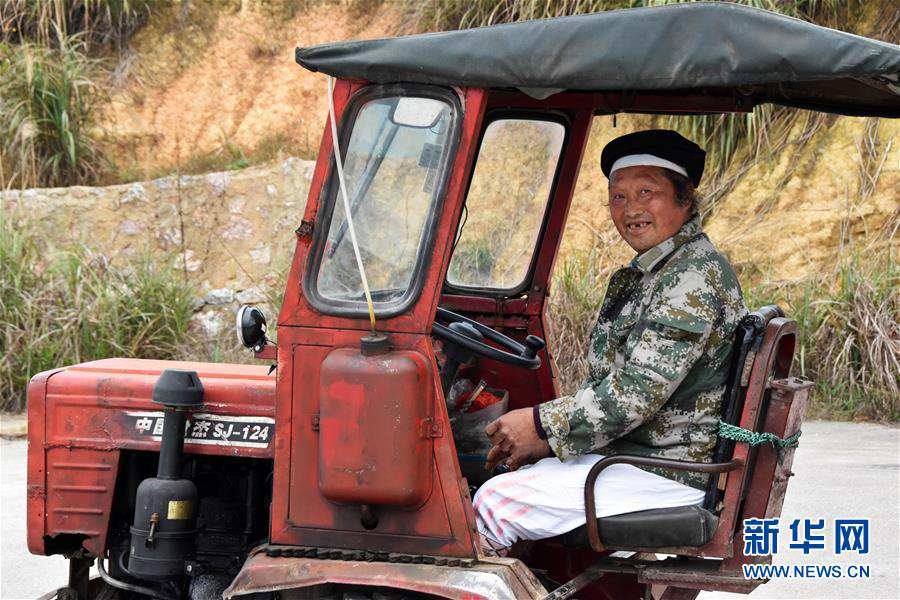
Xingwang resident He Mingfang hauls agricultural products with a tractor on Feb. 28, 2020. (Xinhua/Duan Xianju)
“A teacher named Chen Chaomeng in the city of Shenzhen gave me money to help me finish senior high school,” Yaoshan Yao township head Wang Lubao recounted recently. “I will never forget him.” Wang became the first Yaoshan native to graduate from university. The township has come a long way, and its residents have received a lot of support and assistance, including from people all over China at times. More than 30 Yaoshan natives are currently attending university in various areas, and the township has achieved a 100 percent compulsory education enrollment rate.
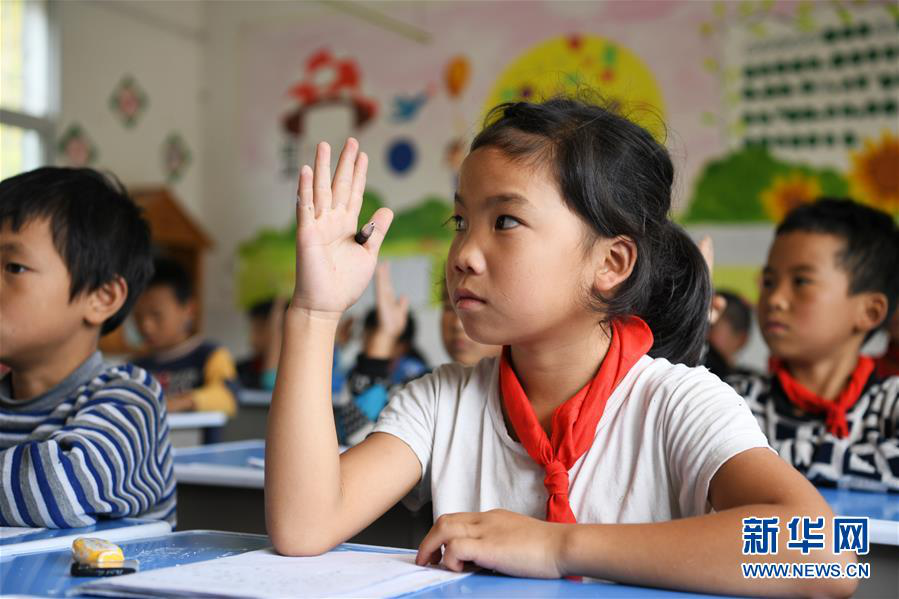
Yaoshan Ethnic Primary School students wait to be called on Nov. 5, 2019. (Xinhua/Yang Wenbin)
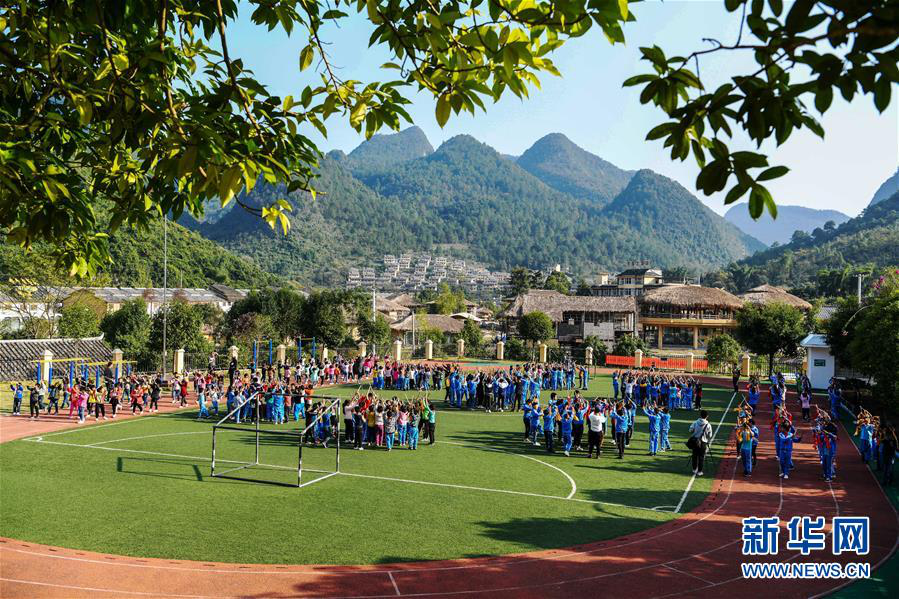
Yaoshan Ethnic Primary School students perform a traditional dance during recess on Nov. 5, 2019. (Xinhua/Yang Wenbin)
“Materially, [Chen] helped me overcome many difficulties when I was young; spiritually, he encouraged me and inspired me,” Wang continued gratefully. “The support he has given me has had a major influence on my life.” Chen currently works at the Shenzhen Vocational and Technical College and still possesses 12 letters that Wang sent him over ten years ago.

Yaoshan Ethnic Primary School students perform a traditional dance on Nov. 5, 2019. (Xinhua/Yang Wenbin)
Becoming more self-reliant in order to live better lives
Many chapters have been written in the history of Yao citizens’ battle against poverty and the seven successive resettlement programs that have been implemented for impoverished Yaoshan natives living in mountainous areas.
“One day, Qin told me that ensuring there is adequate food is not enough,” Xie Jinshan, Shuiyao’s former deputy village committee director, recalled when describing the situation in 2004. “He said that we should find employment opportunities in other areas and urged me to take the lead since I was young.” Xie soon embarked on a new journey in life at the age of 32. The rice fields that impoverished Yaoshan residents tended ensured that they had enough food and were able to obtain clothing but were not satisfying their desires to increase their incomes.
Xie began working as a porter and plasterer in Guangdong province in 2004 and eventually became employed at a factory in Yiwu city, Zhejiang province in 2008. His diligence and integrity paid off, and his boss told him that he could invite other people from his hometown to work with him. Xie was so happy that he was not able to fall asleep the day he received the offer, and 40 of his fellow villagers soon moved to Yiwu and began working at the factory.
“People’s lifestyles and attitudes have changed a lot since they resettled in new environment,” He Chunliu observed. Many of Yaoshan’s inhabitants used to have the habit of sleeping outside after drinking, but that kind of behavior is rarely seen at the Xingwang community. The citizens who live there now work at shops, factories, and construction sites, and some engage in crop cultivation and animal husbandry endeavors in rural parts of the county.
“I have to put in effort on my own if I want to have a good future,” resettled citizen Luo Jiaojin stated. “I’m becoming more confident about living in the urban area.” He leased a one-ha orchard after he resettled in the Xingwang community and has also been raising chickens under the pomelo trees that grow there. Luo Xiaoxin is currently 17 years old and studied hotel management at Libo Vocational School. His parents resettled in the county seat with him but are not in good health, so he began working part time at hotels in his spare time in order to support them.
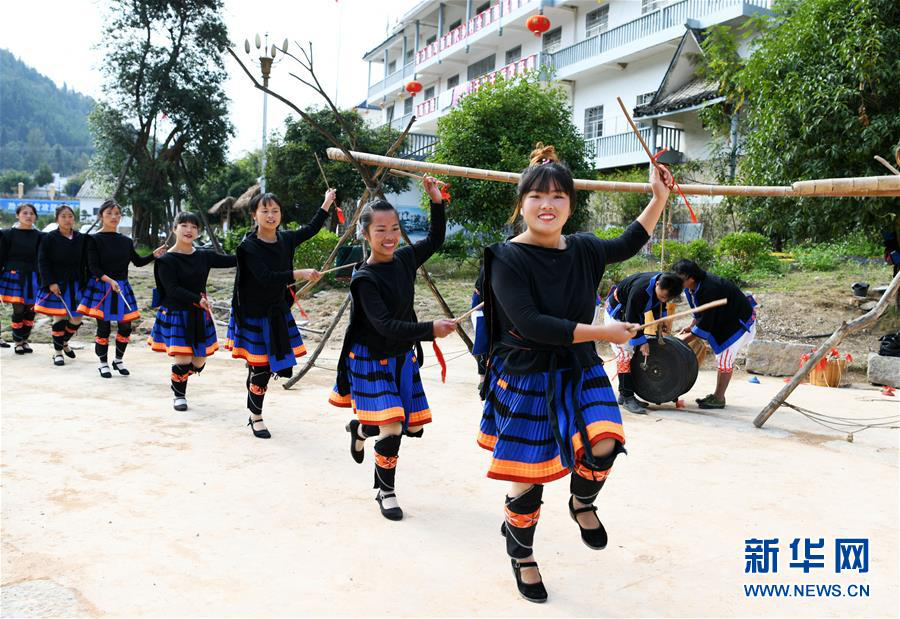
A performance group composed of relocated Yao citizens performs a traditional dance for visitors at the Yaoshan ancient village scenic area on Nov. 5, 2019. (Xinhua/Yang Wenbin)
Yaoshan’s Dongmeng Yao village was conferred with a special new status during the course of Libo’s resettlement efforts. All of its residents have resettled in other areas, and the traditional hamlet was designated a protected historical village in order to promote tourism and employment.
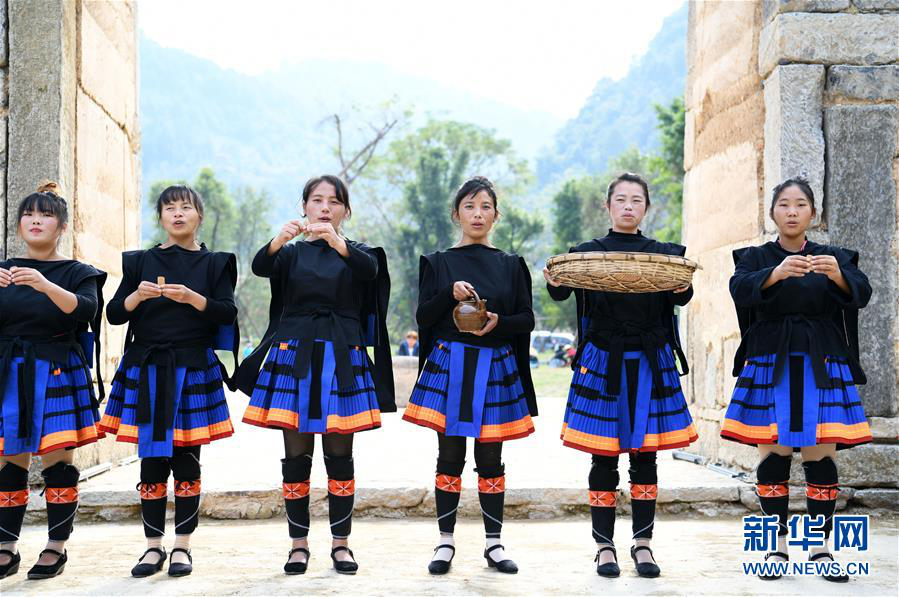
A performance group composed of relocated Yao residents toasts guests at the ancient Yaoshan village scenic area on Nov. 5, 2019. (Xinhua/Yang Wenbin)
“Our ethnic characteristics made me feel confident about starting a business,” Yaoxiufang Embroidery Cooperative President Xie Jincheng noted. “You can always get a lot of attentions if you walk around outside in traditional Yao clothing and white pants.” After having worked elsewhere for a few years, the Libo native returned to the county in 2018 at the age of 30 in order to establish the cooperative. “We shouldn’t forget our roots when we leave the mountains and move to new locations,” Xie concluded.
“He Guoqiang told residents that hanging grass and chicken feathers [above their doors in accordance with local traditions] will not change anything,” He Chunliu recalled when reflecting on practices that some people engaged in during Spring Festival after they moved to the county seat. “He told them that they have to depend on themselves and their country rather than gods.”